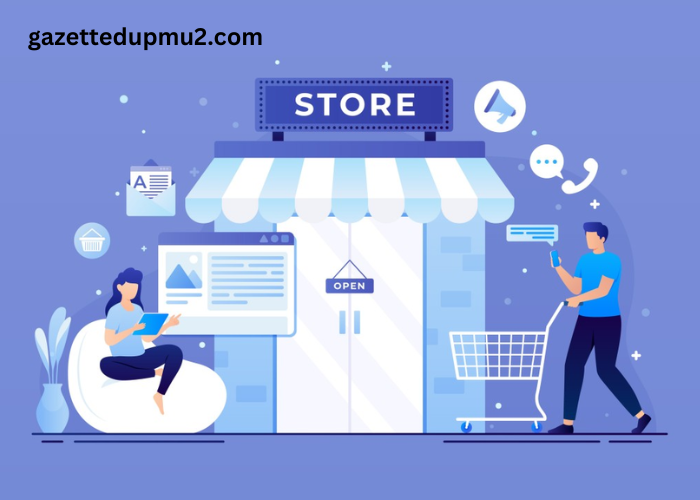Did you know that the global ecommerce market size is projected to hit around $75.12 trillion by 2034? This shows the tremendous growth potential in the ecommerce sector.
In the world of online shopping, the foundation of a successful enterprise lies in its technology. Selecting the right tools can influence the performance and scalability of your online store.
In this article, we will look at the best tools and technologies for custom ecommerce development. Continue reading to discover how these tools can enhance your ecommerce strategy.
Content Management Systems (CMS)
Choosing a powerful CMS can influence your site’s flexibility and performance. A well-selected CMS can help in managing content efficiently. It also enhances the ecommerce capabilities of your website.
Here’s a closer look at some popular options:
Shopify
Shopify is a cloud-based ecommerce platform. It enables businesses to create and manage online stores easily.
Its interface and extensive feature set make it a popular choice for businesses. Shopify allows users to set up their stores without needing extensive technical knowledge. This ease of use reduces the time required to launch an online store.
The Shopify App Store offers thousands of apps and integrations to extend functionality. This can include marketing tools and inventory management solutions.
Magento
Magento is an open-source ecommerce platform. It’s renowned for its flexibility and powerful features.
It allows for extensive ecommerce customization through its modular architecture. This enables businesses to tailor their sites to specific requirements. This makes it highly scalable as businesses grow.
Magento is equipped with built-in SEO features. This allows businesses to optimize their sites for search engines. It also supports marketing automation tools to enhance customer engagement.
WooCommerce
WooCommerce is a powerful ecommerce plugin for WordPress. It enables seamless integration of ecommerce features into existing WordPress sites.
WooCommerce benefits from a large user base and extensive documentation. This makes it easier for businesses to find support and resources.
It also allows users to leverage WordPress’s powerful content management capabilities. This enables effective blogging and content marketing strategies.
Frontend Development Frameworks
The look and feel of your online store are essential for customer retention. A well-designed interface helps attract customers. It also encourages them to explore and make purchases.
Here are some top frontend frameworks for ecommerce development:
React
React is a popular JavaScript library for creating user interfaces. Its component-based architecture allows developers to create reusable UI components. This leads to faster development cycles.
React utilizes a virtual DOM. This minimizes the number of updates to the actual DOM. This results in faster rendering times and a smoother user experience.
React has a large ecosystem of libraries and tools. This makes it easier to build complex applications.
Vue.js
Vue.js is a progressive JavaScript framework. It’s known for its flexibility and ease of integration into existing projects. It allows developers to build interactive and dynamic user interfaces with minimal effort.
Vue.js employs a component-based approach. This allows developers to create self-contained components. These can be reused throughout the application.
Vue.js can be integrated with other projects and libraries. This makes it a flexible choice for businesses looking to enhance existing applications.
Angular
Angular is a robust framework designed for building dynamic single-page applications (SPAs). It’s known for its comprehensive set of tools and features. This facilitates complex application development.
Angular promotes modularity. This allows developers to break applications into smaller, manageable pieces. This modularity enhances maintainability and scalability as businesses grow.
Angular offers a wide range of built-in features. This includes routing, form validation, and HTTP client services. This can speed up development and reduce the need for third-party libraries.
Payment Gateway Solutions
Integrating secure payment options is vital for building user trust. It also improves conversion rates on your ecommerce site.
Here’s a closer look at some leading payment solutions that can help secure transactions:
Stripe
Stripe is a powerful payment processing platform. It provides a range of tools for handling online payments. It’s popular among developers for its robust APIs and extensive customization options.
It supports various payment methods. This includes credit and debit cards, digital wallets, and even cryptocurrencies.
Stripe also offers features for managing subscriptions and recurring billing. This makes it ideal for businesses with subscription models.
PayPal
PayPal is one of the most recognized payment processing ecommerce platforms globally. It’s known for its ease of use and strong buyer protection policies. Its widespread acceptance makes it a familiar choice for many consumers.
PayPal offers easy integration options. This allows businesses to add payment capabilities to their ecommerce sites quickly.
PayPal’s buyer protection policies safeguard customers against unauthorized transactions. This can enhance user confidence in making purchases.
Square
Square is an ideal payment solution for small businesses. It offers a simple interface and a suite of tools for managing both online and offline sales.
It provides a range of services. This includes point-of-sale (POS) systems, invoicing, and online payment processing. This makes it a versatile option for businesses of all sizes.
Square offers powerful analytics features. It can provide insights into sales trends, customer behaviors, and inventory management. This helps businesses make informed decisions.
Effective Testing and Analytics Tools
Measuring performance and user engagement is vital for ongoing optimization in ecommerce. Utilizing the right tools can help you gain insights into customer behavior. It can also help you identify areas for improvement and enhance conversion rates.
Here are some tools to consider:
- Google Analytics
- Hotjar
- A/B Testing Tools
- Crazy Egg
- Mixpanel
- SEMrush
These tools provide a robust foundation for understanding user behavior. It can help you optimize your ecommerce strategy.
Leveraging the insights gained from these tools can help you make informed decisions. It can improve site performance and ultimately boost conversion rates. Using a combination of these tools will help you navigate the ecommerce landscape.
Essential Custom Ecommerce Development Tools
In the custom ecommerce development landscape, leveraging the right technology is crucial for success. By combining these tools and technologies, businesses can create a robust ecommerce strategy.
It will help meet customer needs, enhance engagement, and drive growth. Embracing these advancements will position your online store for long-term success and sustainability.
Don’t forget to explore our other articles. There’s a wealth of knowledge waiting for you on our site.





